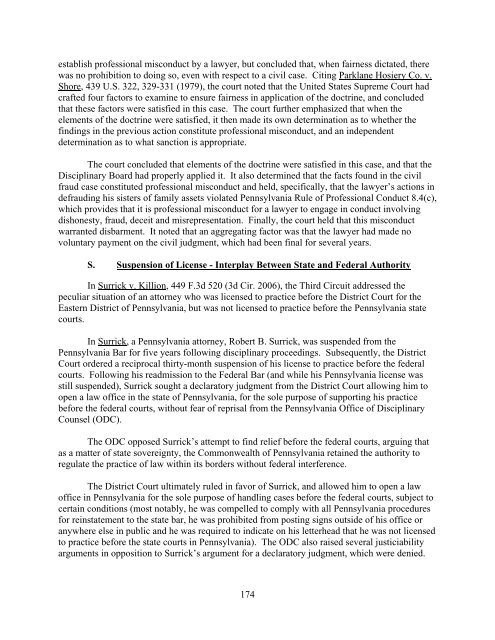2012 PROFESSIONAL LIABILITY UPDATE - Eckert Seamans
2012 PROFESSIONAL LIABILITY UPDATE - Eckert Seamans
2012 PROFESSIONAL LIABILITY UPDATE - Eckert Seamans
Create successful ePaper yourself
Turn your PDF publications into a flip-book with our unique Google optimized e-Paper software.
establish professional misconduct by a lawyer, but concluded that, when fairness dictated, therewas no prohibition to doing so, even with respect to a civil case. Citing Parklane Hosiery Co. v.Shore, 439 U.S. 322, 329-331 (1979), the court noted that the United States Supreme Court hadcrafted four factors to examine to ensure fairness in application of the doctrine, and concludedthat these factors were satisfied in this case. The court further emphasized that when theelements of the doctrine were satisfied, it then made its own determination as to whether thefindings in the previous action constitute professional misconduct, and an independentdetermination as to what sanction is appropriate.The court concluded that elements of the doctrine were satisfied in this case, and that theDisciplinary Board had properly applied it. It also determined that the facts found in the civilfraud case constituted professional misconduct and held, specifically, that the lawyer’s actions indefrauding his sisters of family assets violated Pennsylvania Rule of Professional Conduct 8.4(c),which provides that it is professional misconduct for a lawyer to engage in conduct involvingdishonesty, fraud, deceit and misrepresentation. Finally, the court held that this misconductwarranted disbarment. It noted that an aggregating factor was that the lawyer had made novoluntary payment on the civil judgment, which had been final for several years.S. Suspension of License - Interplay Between State and Federal AuthorityIn Surrick v. Killion, 449 F.3d 520 (3d Cir. 2006), the Third Circuit addressed thepeculiar situation of an attorney who was licensed to practice before the District Court for theEastern District of Pennsylvania, but was not licensed to practice before the Pennsylvania statecourts.In Surrick, a Pennsylvania attorney, Robert B. Surrick, was suspended from thePennsylvania Bar for five years following disciplinary proceedings. Subsequently, the DistrictCourt ordered a reciprocal thirty-month suspension of his license to practice before the federalcourts. Following his readmission to the Federal Bar (and while his Pennsylvania license wasstill suspended), Surrick sought a declaratory judgment from the District Court allowing him toopen a law office in the state of Pennsylvania, for the sole purpose of supporting his practicebefore the federal courts, without fear of reprisal from the Pennsylvania Office of DisciplinaryCounsel (ODC).The ODC opposed Surrick’s attempt to find relief before the federal courts, arguing thatas a matter of state sovereignty, the Commonwealth of Pennsylvania retained the authority toregulate the practice of law within its borders without federal interference.The District Court ultimately ruled in favor of Surrick, and allowed him to open a lawoffice in Pennsylvania for the sole purpose of handling cases before the federal courts, subject tocertain conditions (most notably, he was compelled to comply with all Pennsylvania proceduresfor reinstatement to the state bar, he was prohibited from posting signs outside of his office oranywhere else in public and he was required to indicate on his letterhead that he was not licensedto practice before the state courts in Pennsylvania). The ODC also raised several justiciabilityarguments in opposition to Surrick’s argument for a declaratory judgment, which were denied.174









